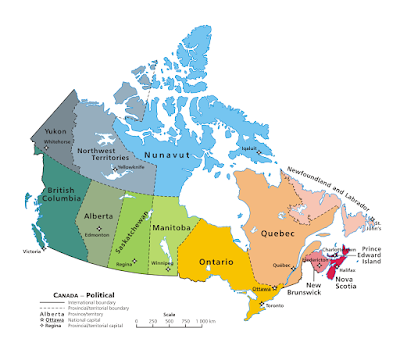My friend Lance is a USA American.
He knows many things about Canada
But he feigns ignorance.
Last week I gave him a jigsaw puzzle with a map of Canada
showing the 10 provinces and 3 northern territories.
Lance is my inspiration for a new blog series:
“Facts about Canada
1. Canada
The coming together was called Confederation,
and the country was named the Dominion of Canada.
July 1st is the national holiday each year,
and we call it Canada Day
(formerly Dominion Day).
2. There were four original provinces:
(Previously, these had been separate British colonies.)
3. Canadian “Indians” are called “First Nations”.
There are 700,000 First Nations people living in Canada
There are over 630 recognized First Nations governments
or bands.
4. Canadian “Eskimos” should be called “Inuit”.
There are about 50,000 Inuit in Canada
half of them in the northern territory of Nunavut
5. Canada
compared to USA California

Interesting indeed!!!
ReplyDeleteVJ
Hi VJ,
ReplyDeleteNice to hear from you. Perhaps every single state of India has more people than does Canada :)
Oh Canada.
ReplyDeleteThe true north strong and free .......
My kinda country.
Canadian, eh?
ReplyDeleteIs Toronto just across the lake from Maine? Any ferries?
ReplyDeleteEnjoyed this one - I always love maps - but don't recognise the new? name for the province in the NW. Did it used to have a different name?
I once was at a minority languages conference where a Canadian speaker surprised us all by talking about the preservation of "First Nation" languages, rather than English/French bilingualism. Either would have been fine, but the First Nation subject was really interesting.
No, Toronto is across the lake from New York State. No lake ferries that I know of, but lots of Seaway traffic through from Lake ontario to Lake Superior. In the 1990s a larger Northwest Territories was split to create Nunavut, which is a distinctly Inuit place with a territorial council that operates as older Inuit councils operated. At the CBC Radio website you can hear a streaming radip station from Iqaluit in the main Inuit language. Nice to hear from you, Philip!
ReplyDelete